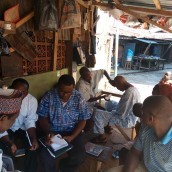Columbia, IFRA, and Sciences Po Research Masterclass in Nigeria

In July 2018, the French Institute for Research in Africa (IFRA) Nigeria (Ibadan), Sciences Po (Paris) and the Institute of African Studies at Columbia University (New York) will host their second joint Research Masterclass in Nigeria, under the direction of IAS director Prof. Brian Larkin and Prof. Laurent Fourchard (Sciences Po - CERI). The class, entitled New Forms of Labor and Circulations of Goods and Persons in Nigeria, is made possible through the support of the French-Americal Cultural Exchange (FACE) Partnership University Fund and Alliance Program will be held this year at Mambayya House in Kano, Nigeria. It comes on the heels of the Sacred Urbanism, Entrepreneurial Religion, Infrastructure and the New Urbanism in Nigeria Masterclass held at the University of Ibadan in July 2017.
The Masterclass is aimed at PhD students in Social Sciences and Humanities at the beginning of their doctoral studies (1st or 2nd year), who have not yet finished conducting their fieldwork, and also at students finishing a research master’s degree and planning to continue with doctoral studies. It trains students in intellectual questions, methods, and writing strategies relevant for their future careers. Participants focus on methodology and engage in reading seminars and firsthand research with the goal of writing a short analysis, which will be published online.
2017's Sacred Urbanism Masterclasss, also supported by the Partnership University Fund and Alliance, brought 18 junior doctoral students from all over Nigeria to the University of Ibadan around the topic of religion as a shaping force in urban space. It has long been true that urban studies has viewed religion as something that happens in cities but not as a producer of urban space. In response to this, recent scholarship examines the ways that faith-based movements are increasingly coming to take on a role formerly played by the state in shaping the infrastructures, residences, schools, economies, and cultural practices of urban life. This is spectacularly the case in the prayer cities that have formed along the Lagos-Ibadan corridor in which massive gated communities represent a distinct form of gated urbanism complete with electricity supply, road building, education and health facilities, and water supply all provided by religious institutions rather than the state. Over the course of the 2017 Masterclass, students engaged in reading seminars around the Sacred Urbanism theme, developed intellectual questions around that topic, and pursued primary research at a field site. The masterclass examined arguments about the ways in which religious movements are increasingly coming to shape the future of urbanism in Nigeria.
This year, the Research Masterclass centered on the subject of New Forms of Labor and Circulations of Goods and Persons in Nigeria. Precariousness of work has become dominant in most of African economies under structural adjustment. Formal employment has been replaced with a far more amorphous, more lowly paid, insecure casualized work and self-employed petty trade with erratic earnings. The opening up of the market, the lowering of trade barriers, the urbanization process and the commoditization of services have simultaneously increased the circulation of goods and people and have created new job opportunities.
The 2018 Masterclass focused on the ways in which these circulations shape or reshape the labor market in a context of massive precariousness. If phenomenon such as migrations, informal labor and rural exodus have been extensively studied, movement of people and goods have seldom been looked at as emerging factors of new forms of labor. This included business strategies focusing on new types of transnational goods (electronic and ITC service providers, religious materials), on travelers and pilgrims as targeted customers or on activities developed within groups characterized by their mobility (drivers, traders, waste collectors…). Once again, students participated in a combination of seminars and data collection in the field, culminating in a write-up and presentation of their research.
